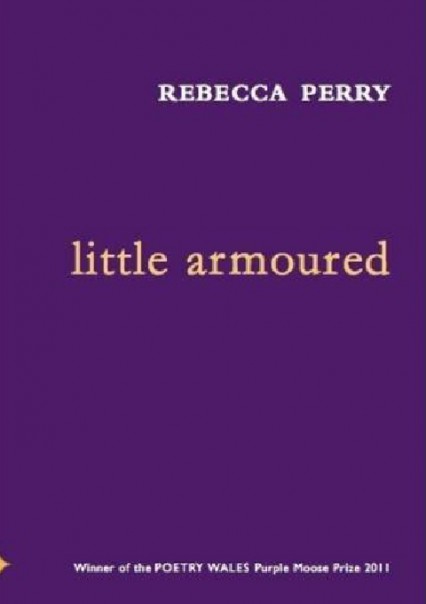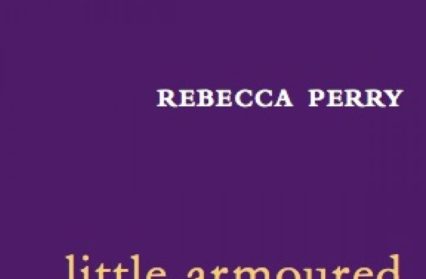Carl Griffin reviews little armoured, a poem collection by the 2011 POETRY WALES Purple Moose prize winner, Rebecca Perry.

Rebecca Perry’s little armoured was the winner of the 2011 Poetry Wales Purple Moose Poetry Prize, a competition that asks for short collections from unpublished poets and publishes, through Seren, a pamphlet of the best one, as decided by the judges (in this case John Barnie and Zoë Skoulding). The competition isn’t limited to poets from or living in, Wales, which means it doesn’t stand out from competitions with the same format. Rebecca Perry, from England, is a worthy winner, though the pamphlet has plenty of weaknesses, unsurprising when you realise the poet is still in her twenties.
The opening half of little armoured is a tribute to the poet’s father (the assumption is the ‘late’ father but as this isn’t stated clearly it is only an assumption). The sentimentality doesn’t get in the way of good writing; the stumbling block is the gimmickry on show, stuffed mostly into this opening half.
‘Namgalsipschlar’ is broken into parts which are all named, and all about, different chemical elements. Other clouds is a dialogue between the poet and her father and don’t add up to much more than that; the words ‘he said’ are used on sixteen occasions; the poet also uses ‘i’ instead of I, an attention-seeker which is not even used consistently throughout the pamphlet. ‘Wasp’, a poem simply about a wasp, features the word ‘little’ twenty-three times, an impressive feat considering the poem is only fourteen lines long.
It is only when Rebecca Perry departs from these two elements that her quality comes up trumps. The eponymous poem ‘in praise of air rifle shooting instructors’, where the title stoically serves as the first line (because it works and is effective, you can call it mastery of the craft rather than a gimmick), is a short comic poem which is superbly written. The instructors of the title are heroic:
and never flinch
and believe absolutely in your closed eye,
the muscle of your middle finger,
Although my own personal experience of air rifle shooting instructors differs, in that the instructor has always stood beside me while I fired and not the target, the poem has believability and an image any reader can connect with. We all have experiences of witnessing the likes of sports instructors injured, or on the verge of injury, during the daring teaching of an accident-prone learner. Writing funny poems while retaining the general principles of good poetry is fiendishly difficult. The humour here doesn’t cheapen the poem, it enhances it:
who stand in shorts
bearing the still-a-little-pink scars
like constellations on their shins
and believe absolutely it won’t happen again.
Another good short poem is Shifting, which came third in the 2010 Plough Prize. Though lacking humour, it has great imagery. Sticking with the funereal vibe, the longer poem ‘when the wind full of space wears out our faces’ (after Rainer Maria Rilke’s Duino Elegies) is one of the highlights in a strong middle section. It might not be light reading, but her sentiments ring true:
we are allowed to cry
in the toilets at work
when someone young dies.
This sums up our society on different levels. It seems to pose a question or two: what if the deceased is not young but someone older than us? and what if the sobbing escalates, boiling over into the workplace, in public? For how long would people still be understanding? Perry doesn’t seem to feel everyone else is on the same wavelength:
tell me how good it is
to wake from a bad dream
and have someone there and I will tell you
that things, more often than not
won’t work themselves out.
Humour returns in a poem that is more ‘great potential’ than ‘great poem’. The concept is a cliché: a god with views about humans and human emotions. This time the god is Apollo and his musings are about love, some of which are simultaneously witty and reassuring:
You should watch your lover on the toilet, at least once.
You should be happy to share bathwater.
This closeness between two adults can be seedy. It can also be intimate, a beautiful acceptance; not just an accepting of others and their disgusting (though normal) habits, but also allowing them to see ourselves being disgusting, dirty, while no one else ever earns the privilege. Though of course, this is not necessarily how the poet sees love and could even be, though it squares up with my own perception of love, a playful tug at an outsider’s naivety.
It feels harsh to criticise any poet still in their twenties, but the criticism is only frustration. Once she ditches the villanelle, the needless gimmick, Rebecca Perry’s future collections will overfill with the quality which, in little armoured, appears only here and there. If only every poem in this pamphlet included lines like:
You should never feel nervous when your lover holds scissors.
Rebecca Perry‘s poem collection, little armoured is available now.
Carl Griffin often contributes poetry-related content to Wales Arts Review.












